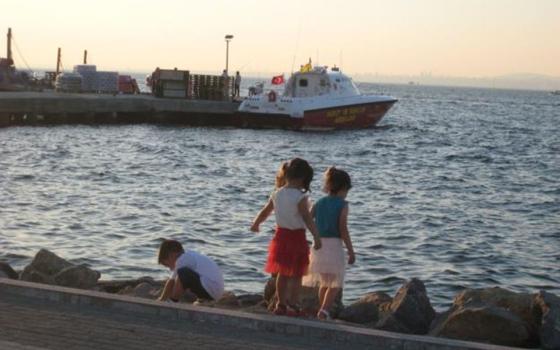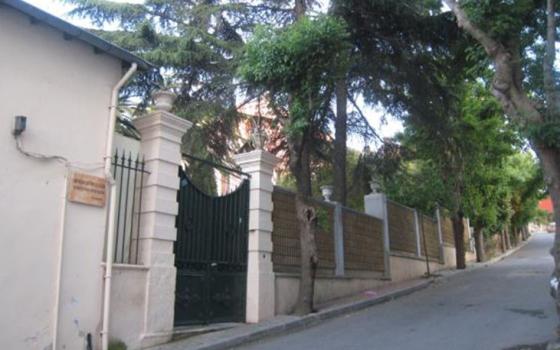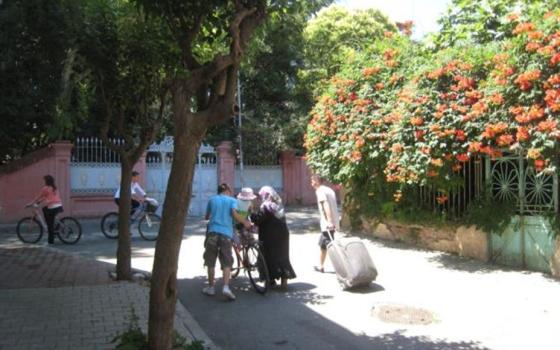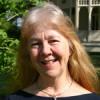As recent news has shown Pope Francis with Muslim and with Greek Orthodox leaders in Istanbul, I have been thinking of my experiences there. He has heard the Muslim call to prayer, as I have there.
A few times between leading study tours with our university students in Turkey and doing some research on peacebuilding through education in Iraq, I have been blessed with the opportunity to make my annual retreat near Istanbul on the island of Beyukada. This peaceful small island does not allow cars. The first time I made a retreat on the island, I was walking a few blocks from San Pacifico, the church built by the Franciscans in 1886, and I came across a Turkish sign by the gate to a large house. I was guessing that it indicated a place for the Vatican Apostolic Nuncio. That night as I browsed through a booklet I had picked up in Istanbul, a picture jumped off the page at me – Monsignor Angelo Roncalli in the garden of the residence on Beyukada in 1939.[i]
I had no one to talk to on the island, and I began to feel like the man who was to become Pope John XXIII was talking to me as I walked the streets that he would have walked. I read more of his writing and his history.[ii] He had been sent from a promising career in the center of church activity in Italy to be a “papal visitor” in Bulgaria. He seems to have gotten the “promotion” because some church men did not like his progressive ideas. He constantly prayed to help God’s people wherever he was.
Roncalli had no official status in a predominantly Orthodox country with many people hostile to Roman Catholics. He was kind and cordial and personally helped all, regardless of their faith, in several disasters. This eventually won him the friendship of many, including King Boris. The challenging situations were making Roncalli better rather than bitter. I felt like he was nudging me to be more open to grace in some challenging situations in my life.
In 1935 when in his mid-50s, Roncalli was appointed Apostolic Delegate to Turkey and Greece, and he resided in Istanbul. When he came here to the island, did he reflect on his past assignment in Bulgaria? Did living there open his heart to how minority people might feel and give him more compassion?
Though Istanbul is a lovely city, Roncalli felt tension, with Hitler gaining power and Nazi control spreading. I have taught a class on the history of the Holocaust and know harrowing stories. Turkey was a neutral country during World War II. Sept. 5, 1940, Roncalli learned of the plight of Jews in Nazi-occupied areas from Jews who were fleeing from Poland. He helped them reach the British colony of Palestine. When Roncalli walked and prayed here on the island, did he stroll by the small synagogue that I pass? I think that he must have reflected on Jesus as a Jew and on Paul who was born in what is now Turkey.
Five times a day as I would hear the Adnan, the Call to Prayer, from the nearby mosque, I thought of Roncalli hearing that. Muslim prayer especially focuses on God as compassionate and merciful. Was the Muslim culture of Turkey helping Roncalli to enter ever more deeply into the compassion of God in this time of people of “Christian nations” committing atrocities towards the Jews? Did he reflect on the compassionate Muslims who gave sanctuary to the Jewish refugees fleeing Spain in 1492? Roncalli tried to get Vatican radio to broadcast that helping Jews would be an act of mercy and was encouraged by the church. The Vatican refused to do that, but Roncalli used all means that he could to help the suffering.
Sometimes sisters do what others will not risk. In 1944 when the Nazis were purging Jews in Hungary, Roncalli had heard that Hungarian nuns were helping Jews.[iii] Some of the sisters were beaten or harassed, and a few were killed, but the sisters continued their life-saving work. I wondered which sisters Bishop Roncalli was hearing about.[iv] The Sisters of Social Service saved about a thousand Jews. They had been founded in Hungary in 1923 to help the needy, and they had a strong commitment to respecting human dignity and speaking for justice. They were led by Sr. Margit (1884-1974). She had gone to Rome and personally given Pope Pius XII a report that she had written on how Jews were being persecuted in Slovakia. While Pope Pius XII has been accused of not doing enough for the Jews, after the Pope got information from Schlachta, he seems to have used his influence. The Slovakian bishops began standing together in behalf of Jews and this stopped Nazis from deporting many. Do I have the love and the courage to speak prophetically to church leaders and civic leaders as Sr. Margit did? Sometimes they have rejected things I have said. Will I and will we keep trying to listen to the Spirit and speak when we are prompted?
Sara Salkahazi, (1899-1944) entered the Sisters of Social Service and eventually wrote against Nazi ideas and hid many Jews. She realized that her “illegal work” was putting her life in danger. Finally she and the Jews she was helping were arrested. They were shot and thrown in the Danube River.[v] Had Roncalli heard of her? He took risks: quietly speaking to officials, trying to influence governments and sending documents. He sent immigration certificates issued by the Palestine Jewish Agency to Vatican diplomats and sisters. There were some situations in which Roncalli used every means he had, but was not successful in helping Jews escape.
We women in the church and women religious have been working on some things that, despite all our efforts, have not been successful. Is this how Roncalli felt? Can we continue to trust in a loving God? As I walk by the seashore where Roncalli would have walked, I begged him to help us have firm hope. When he was being considered for canonization, the German Ambassador to Turkey Franz Von Papen said that Roncalli had eventually helped 24,000 Jews.[vi]
Because there are so few Roman Catholics on the island, there is no regular Eucharist at San Pacifico Catholic Church, so I have gone to the Divine Liturgy with the Greek Orthodox. While Roncalli was living in Istanbul, he worked to build reconciliation with the Patriarch of Constantinople and the Greek metropolitans. For several centuries the Orthodox hierarchy and Catholic hierarchy would not meet. He began to have meetings. Roncalli gave a homily on Pentecost in 1944 that reveals how he was learning from his experiences:
"Here, we Latin Catholics of Istanbul and Catholics of Armenia, Greece, [the] Chaldean, Syrian rite – we are a modest minority living on the surfaces of a vast world we are just superficially in touch with. We love to distinguish ourselves from those who do not profess our faith, from the Orthodox, Protestants, Israelis, Muslims, believers or nonbelievers."
Even if "diversity of race, language, education, painful contrasts of a sad past keep us in reciprocal distance, in the light of the Gospel," Jesus "has come to tear the walls down; he died to proclaim our universal brotherhood; the central focus of his teaching is the love that links every [person] to him as the first of brothers and that links him with us to the Father."[vii]
Roncalli preached that love links all of us. Considering the triumphalist inward-looking Catholic church of the 1940s, Roncalli’s concept of love linking all was certainly challenging. Christ has “come to tear down walls.” On Pentecost Sunday, as I prayed with the Greek Orthodox, I tried to recommit myself to building bridges, not walls. I have taken students to pray at the wall separating our state of Texas from Mexico and to the Bethehem wall separating Israel and Palestine. I am working on the walls in my own heart.
In his 10th year in Turkey, Roncalli was named Apostolic Nuncio to France. Did he miss this lovely island retreat place? The Nazi era was coming to an end, but the countries of Europe were racked with both pain and shame. Roncalli had written that the massacre of the Jews was like “six million crucifixions.”
Eventually Roncalli became Pope John XXIII for only five years, from 1958 to 1963, but his prophetic courage had a huge impact. I entered the convent the year that he opened the Second Vatican Council. Roncalli’s conscience and his actions had been shaped by his human experiences, not just by abstract laws and traditions. As I prayed, I thought about the Hungarian Sisters “doing illegal things” and how their courage positively influenced a fearful pope and Roncalli, the man who would become pope. As I have strolled by the entrance of the Apostolic Nuncio’s residence, I feel like I have heard St. John XXIII whisper, “Live with even more compassion and courage. Speak lovingly and persistently.”
[Martha Ann Kirk, CCVI, is a professor of Religious Studies at the University of the Incarnate Word, San Antonio, Texas, and the author of Iraqi Women of Three Generations: Challenges, Education, and Hopes for Peace, based on her exhibit of photos and interviews.]
[i] Türk Dostu, Papa Roncalli Giovanni XXIII (1881-1963) Istanbul: VATİKAN BŰYŰKELҪİLİĞİ İSTANBUL TEMSİLCİLİĞİ, 2006, p. 19.
[ii] John XXIII. Journal of a Soul. trans. Dorothy White: New York: McGraw-Hill Book Company, 1965. Peter Hebblethwaite. Pope John XXIII, Shepherd of the Modern World. Garden City, NY: Doubleday & Company, Inc., 1985.
[iii] “Pope John XXIII and the Jews” by Joseph D’Hippolito, August 20, 2004, The International Raoul Wallenberg Foundation http://www.raoulwallenberg.net/roncalli/articles-11/pope-john-xxiii-jews/#.
[iv] Andras Zakar, “The Persecution of Jews in Hungary and the Catholic Church During the German Occupation, 19 March 1944–4 April 1945” The Church in History Information Centre http://www.churchinhistory.org/pages/booklets/zakar(n)-2.htm. Dr. Zakar wrote that his information was from Antal Meszlényi’s book The Hungarian Church and the Protection of Human Rights.
[v] “1st Beatification in Hungary in 900 Years,” Sept. 17, 2006 (Zenit.org) http://www.raoulwallenberg.net/press/2006-press/hungarian-martyr-beatified/
[vi] Hebblethwaite, p. 186.
[vii] Andrea Gagliarducci, “What is John XXIII’s message to the Church today?” http://www.ncregister.com/site/article/roncallis-eyes-were-always-on-the-prize#ixzz32rIHtaKE.




